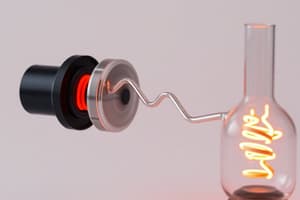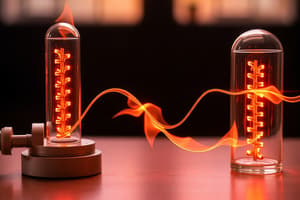Podcast
Questions and Answers
Which law states that the entropy of an isolated system always increases over time?
Which law states that the entropy of an isolated system always increases over time?
- Second Law (correct)
- Third Law
- First Law
- Zeroth Law
What is the equation that represents the change in internal energy of a system?
What is the equation that represents the change in internal energy of a system?
- ΔU = W - Q
- ΔU = W + Q
- ΔU = Q - W (correct)
- ΔU = Q + W
What type of process is characterized by a constant temperature?
What type of process is characterized by a constant temperature?
- Isothermal (correct)
- Adiabatic
- Isobaric
- Isochoric
Which term refers to the total heat content of a system?
Which term refers to the total heat content of a system?
In which type of system is neither matter nor energy exchanged with the surroundings?
In which type of system is neither matter nor energy exchanged with the surroundings?
What is the efficiency formula for a heat engine?
What is the efficiency formula for a heat engine?
What does a refrigerator primarily do?
What does a refrigerator primarily do?
As temperature approaches absolute zero, what happens to the entropy of a perfect crystal?
As temperature approaches absolute zero, what happens to the entropy of a perfect crystal?
Flashcards are hidden until you start studying
Study Notes
Thermodynamics
-
Definition: The branch of physics that deals with heat, work, temperature, and the laws governing energy transfer.
-
Key Concepts:
-
System and Surroundings:
- System: The part of the universe being studied.
- Surroundings: Everything outside the system.
- Types of Systems: Open, closed, and isolated.
-
Laws of Thermodynamics:
- Zeroth Law: If two systems are in thermal equilibrium with a third, they are in equilibrium with each other.
- First Law (Law of Energy Conservation):
- Energy cannot be created or destroyed, only transformed.
- ΔU = Q - W (Change in internal energy = heat added to the system - work done by the system).
- Second Law:
- Entropy of an isolated system always increases over time.
- Heat cannot spontaneously flow from a colder body to a hotter body.
- Third Law: As temperature approaches absolute zero, the entropy of a perfect crystal approaches zero.
-
-
Key Terms:
- Heat (Q): Energy transferred due to temperature difference.
- Work (W): Energy transfer resulting from a force acting over a distance.
- Internal Energy (U): Total energy contained within a system.
- Enthalpy (H): Total heat content of a system, H = U + PV (where P is pressure and V is volume).
- Entropy (S): Measure of disorder or randomness in a system.
-
Processes:
- Isothermal: Constant temperature (ΔU = 0).
- Adiabatic: No heat exchange with the surroundings (Q = 0).
- Isochoric: Constant volume (W = 0).
- Isobaric: Constant pressure.
-
Heat Engines:
- Devices that convert thermal energy into mechanical work.
- Efficiency (η) = (Work output / Heat input) = 1 - (Q_c / Q_h), where Q_c is the heat rejected and Q_h is the heat added.
-
Refrigerators and Heat Pumps:
- Refrigerators: Transfer heat from a colder reservoir to a hotter one, using work.
- Coefficient of performance (COP) = Q_c / W (useful for efficiency comparison).
-
Applications:
- Power generation (steam engines, internal combustion engines).
- Refrigeration and air conditioning.
- Biological processes (metabolism).
Definition and Key Concepts
- Thermodynamics studies heat, work, temperature, and energy transfer laws.
- A system is the part of the universe under study, while surroundings include everything outside the system.
- Systems can be classified as open (exchanging matter and energy), closed (exchanging energy only), or isolated (no exchange).
Laws of Thermodynamics
- Zeroth Law: Establishes thermal equilibrium; if two systems connect with a third, they are also in equilibrium with each other.
- First Law: Energy conservation principle stating that energy cannot be created or destroyed.
- Formula: ΔU = Q - W (Change in internal energy equals heat added minus work done).
- Second Law: Indicates that entropy in an isolated system increases over time; heat cannot spontaneously move from cold to hot areas.
- Third Law: As temperature nears absolute zero, a perfect crystal's entropy approaches zero.
Key Terms
- Heat (Q): The energy that moves between objects due to temperature differences.
- Work (W): Energy transfer achieved through force acting over a distance.
- Internal Energy (U): Total energy within a system, encompassing kinetic and potential energies.
- Enthalpy (H): Total heat content represented by H = U + PV, where P is pressure and V is volume.
- Entropy (S): Quantifies disorder or randomness within a system.
Types of Thermodynamic Processes
- Isothermal: Occurs at constant temperature, resulting in ΔU = 0.
- Adiabatic: No heat exchange with surroundings, so Q = 0.
- Isochoric: Constant volume, meaning W = 0.
- Isobaric: Constant pressure maintained throughout the process.
Heat Engines
- Devices designed to transform thermal energy into mechanical work.
- Efficiency (η) is calculated as η = (Work output / Heat input) = 1 - (Q_c / Q_h).
Refrigerators and Heat Pumps
- Refrigerators move heat from a colder area to a hotter one by using work input.
- Coefficient of performance (COP) is defined as COP = Q_c / W, essential for measuring efficiency.
Applications of Thermodynamics
- Power generation in systems such as steam engines and internal combustion engines.
- Utilization in refrigeration and air conditioning systems.
- Key role in biological processes, particularly metabolism.
Studying That Suits You
Use AI to generate personalized quizzes and flashcards to suit your learning preferences.




